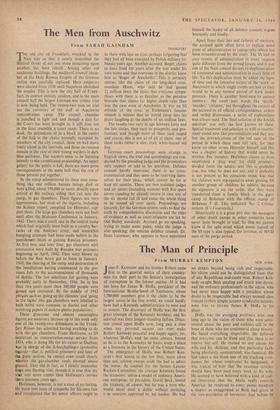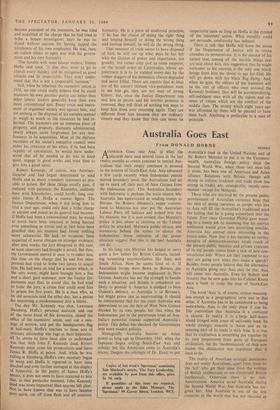The Man of Principle
From MURRAY KEMPTON
NEW YORK
JOHN F, KENNEDY and his brother Robert came j first to the general notice of their country- men for their part in the Senate's investigation of corruption in the labour unions. If it had not been for James R. Hoffa, president of the International Brotherhood of Teamsters, whose 1,700,000 members give it the claim to be the largest union in the free world, we could hardly have had a Kennedy administration to miss and to mourn. The discovery of Hoffa was the first great triumph of the Kennedy brothers; and his survival was their longest-standing failure. Disas- ters crowd upon Hoffa now, long past a time when any personal success can ever make Robert Kennedy peaceful and happy again; yet, whatever Hoffa's end, he must always, bound as he is to the Kennedys he hates, keep a place as a footnote in the history of the United States.
The emergence of Hoffa was Robert Ken- nedy's first lesson in the law that, more often than not, reform sweeps aside the bad to admit the worse. As counsel for the Senate Labour Rackets Committee, the younger Kennedy found the teamsters' union a model of ordinary Ameri- can enterprise; its president, David Beck, looted the treasury, of course, but he was a man who would never steal a dollar without investing it in ventures approved by his banker. He had
no dream beyond being rich and respectable; his vision could not be distinguished from that of any Republican real-estate man. Robert Ken- nedy caught Beck stealing and struck him down; and the ordinary professionals in the union, who had never been happy with a president whose desire to be respectable had always seemed class treason to their simple larceno-syndicalist natures, were free to elevate James R. Hon in his place.
Haifa was the avenging proMtaire who rose long ago in the vision of those who were senti- mental about the poor and endures still in the hope of those who are sentimental about history. He hated everything respectable. He believed that everyone can be fixed and that there is no motive but self. He trusted no one except his wife and his children; and that particular faith, being absolutely concentrated, was fanatical. He had taken a fee from one of the trucking com- panies for whose employees he bargained; it was typical of him that the resultant retainer should have been paid every week to his wife. He seemed to have believed with a kind of radi- cal innocence that the Mafia really, controls America; he rendered to every minor hoodlum a respect as exaggerated as Beck had given to the vice-presidents of breweries. Just before he became president of the teamsters, he was tried and acquitted of the charge that he had tried to bribe a Senate investigator; later he was in- dicted without success for having tapped the telephones of his own employees. He was, then, an outlaw alone, at open war with his govern- ment and his own fraternity.
'The trouble with most labour leaders,' Jimmy Hoffa said once, 'is that they want to go to church every Sunday and be recognised as good citizens and be respectable. They don't under- stand that this is not a respectable business.'
Still, when he inherited the teamsters' union in 1958, no one could really believe that he could maintain his own peculiar purity any better than other labour leaders generally keep their own more conventional sort. Every voice and instru- ment of organised society was against him; and yet nothing at the disposal of his enemies seemed to weigh as much as the resources he had in- herited. The teamsters are an immense piece of property, and property, discreetly administered, nearly always earns forgiveness for any mal- feasance in its acquisition. Most of the thirteen members of his union's executive council were either his creatures or his allies; if he had been capable of calculation, he would have under- stood that all he needed to do was to keep quiet, engage in good works and trust time to give him a good name.
Robert Kennedy, of course, was Attorney- General and had begun determined to send Hoffa and as many attendant teamsters as pos- sible to prison. But these things usually pass, if endured with patience; the Kennedys, suddenly busy with Khrushchev, could hardly long con- sider James R. Hoffa a cosmic figure. The Justice Department, when it did bring him to trial a year ago, could only find a bribe charge as ancient and minor as its quarrel had become; if Hoffa had been a conventional man, he would at worst have been annoyed at being harried over something so trivial and at best have been gratified that his enemies had found nothing more substantial. He had, on occasion, been acquitted of worse charges on stronger evidence; after nine weeks, the jury disagreed in this case, as most observers had thought it would. But then, the Government moved at once to re-indict him, this time on the charge that he and five other persons had tried to bribe two jurors to acquit him. He had been on trial for a matter which, at the very worst, might have brought him a fine and a short gaol sentence; now the Justice De- partment says that, to avoid this, he had tried to bribe the jury, a crime that could send him to prison for five years. He is a man who, as an old associate said the other day, has a genius for improving a misdemeanour into a felony.
The day Mr. Kennedy was shot, Lawrence Steinberg, Hoffa's personal assistant and one of the more loyal of his domestics, closed the office of the teamsters' union, sent out a mes- sage of sorrow, and put the headquarters flag at half-mast. Hoffa's reaction to these acts of ordinary citizenship was rage at their hypocrisy; all he seems to have been able to understand Was that, with John F. Kennedy dead, Robert Kennedy must cease his prosecutions and leave James R. Hoffa at peace. And, while he was railing at Steinberg, Hoffa's own secretary began to weep and Hoffa is reported to have been shocked and even further outraged at this display of hypocrisy. In the purity of James Hoffa's nature, it does not seem to have occurred to him that, in that particular moment, John Kennedy dead was more important than anyone left alive. Not to have known that was to have become pure spirit, cut off from flesh and all common humanity. He is a piece of unalloyed principle; if he has the choice of doing the right thing and helping himself or doing the wrong thing and hurting himself, he will do the wrong thing.
That moment of truth seems to have disposed of him; he will use up what days he has left with the illusion of power and importance, not grandly, but rather only cast as some emperor, on the moral order of Commodus, whose ap- pointment it is to be stabbed every day by the rubber daggers of his domestics, always degraded and never killed. There are reports that at least ten of his union's thirteen vice-presidents want to see him go; they are not men of strong kidney;' but, once the Justice Department can seal him in prison and his terrible presence is removed, they will think of nothing but ways to keep him from ever returning again. They are different from him because they are ordinary sinners and they know that they can never be respectable ones so long as Hoffa is the symbol of the teamsters' union. What morality could not persuade, conformity has induced.
There is talk that Hoffa will leave the union if the Department of Justice will in return abandon its prosecutions. It is the essence of his nature that, among all the terrible things that are said about him, this suggestion that he might surrender to his enemies is the only one which brings from him the threat to sue for libel. He will go down with his black flag flying. And, when he goes, the officers of the teamsters will be the sort of officers who once aroused the Kennedy brothers; they will be accommodating, self-indulgent men with all the values and ab- sence of values which are the comfort of the middle class. The society which eight years ago was affronted by them will be pleased to have them back. Anything is preferable to a man of principle.



































 Previous page
Previous page